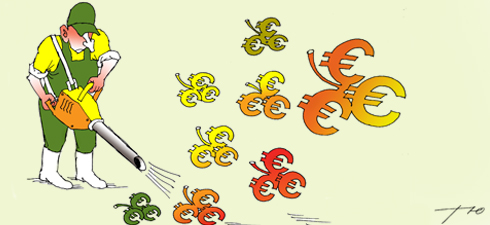Thanks to the statements of two of the most senior officials in charge of the fate of the single currency, sovereign debt markets stayed calm during August.
First it was European Central Bank (ECB) President Mario Draghi, who late in July declared that the ECB was ready to “do whatever it takes“ to ensure the survival of the euro, opening up the prospect of a massive intervention in the markets by the ECB to keep interest rates for Italy and Spain at tolerable levels.
Then, last Thursday, the German Chancellor dispelled all doubts of her support for the guarantees made by the ECB president, which she considers “fully in line” with her own conception of affairs.
Black September
So why forecast a “Black September” for the euro crisis? Because Europe, two years on, is hopping from “victory” to “victory” right up until it reaches its next defeat? Because behind this summer calm, the markets continue to harbour profound doubts about the viability of the single currency?
To these two reasons, which reality will confirm or prove wrong, we can add signals of mounting concern that Europe is on the verge of losing the political battle that will truly decide its future. And August was particularly rich in signals of this kind.
Earlier this month, in a now famous interview given to Der Spiegel, Mario Monti summed up the issues. “Tensions in the euro area these last years have exposed signs of the psychological dissolution of the European Union (...). If the euro becomes a factor in the disintegration of the European Union, the foundations of the European project will be demolished.”
Events were to prove Monti right, showing almost irrefutably that the markets are not the only ones to doubt the euro will survive.
Doubts mount
In the latest episode to date, the Finnish Minister of Foreign Affairs has admitted publicly that his government had made contingency plans to deal with a possible implosion of the monetary union. The quick denials from the government in Helsinki and their assurances that the minister's statement was not official policy went unheeded: the debate in Finland now is whether it should leave the euro.
Unlike in Germany, in Finland matters can be stated much more clearly in the debate, because the consequences would be much less severe for the country. In Germany, all the same, we have heard the Minister of Economy declare that a Greek exit from the euro was no longer inconceivable.
We have seen several prominent personalities of the CDU-CSU express their outrage at the “insolence” of the President of the Eurogroup, Jean-Claude Juncker, who had the audacity to declare that Germany had its share of responsibility in the worsening euro crisis by asking a simple question: “Is the eurozone any more than a branch of the Federal Republic?”
A quick glance at the headlines of German papers is enough to leave no doubt about the seriousness of the “prejudices“ that Mario Monti speaks of in Der Spiegel and the dangers of this “psychological dissolution” of Europe that he warned against. All of the papers seem to be expecting a return of the “Iron Chancellor”, to stand up against Greece, which is demanding more time.
Against the ECB, which has arranged to pump money into the “defaulter” countries. And against France, which intends to ensure the welfare of its retirees on the backs of the German taxpayer.
Tough questions
In the other countries of northern Europe, the political climate is not very different. In the South, the question is about how far austerity can be pushed without killing the very idea of the European Union – or how far the policy of “humiliation”, brought on by a bail-out that voters are willing to tolerate, can go.
There are two hopes facing this accelerated risk of the political dissolution of Europe, and the highest officials in Brussels are clinging to them.
The first hope is Angela Merkel herself. Most are convinced that the Chancellor is fully committed to saving the euro, because saving the euro is in Germany's interest. Some doubts, however, linger.
Just how far can the Chancellor go to reconcile the two objectives that seem to motivate her – to save the euro and to prevent a right-wing nationalist party from emerging in Germany, as has happened in Finland and the Netherlands? Some observers believe her a master in the art of navigating this ever narrowing path.
Others believe that the climate of German public opinion has shrunken her room for manoeuvre and that they will have to wait for the September elections and a “grand coalition” with the SPD to give her the capability at home in Germany to do what needs to be done.
Second hope
The second hope, the most obvious one, boils down to the key political issue that all the governments of the eurozone have to confront: if not the euro, what is the alternative?
The thing that makes September so dramatic in terms of tacking the European problem, is that it is practically impossible to know at which moment Europe will have committed itself too deeply to the dissolution path, to reverse direction.
Or, in other words, to know what the event will be the one to mark a turning point in the European crisis. A verdict in the German Constitutional Court on September 12 which rules against the European Stability Mechanism? The outcome of elections in the Netherlands on the same day? Something else? No one knows. That is the great risk facing Europe today. Just replace the word “prejudice” with “nationalism."



